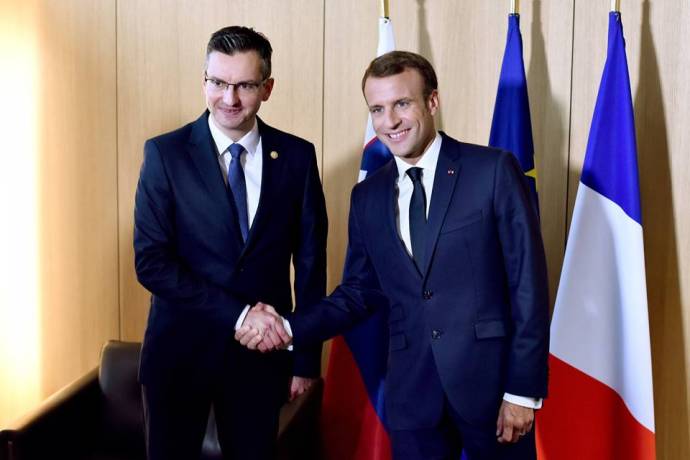The pair met for their first bilateral meeting since Šarec took office in mid-September ahead of the EU summit, which is discussing migration and security issues.
"They exchanged views on the EU's future. They confirmed the excellent relationship between the two countries and an interest in intensifying Slovenian-French cooperation further," the Slovenian mission to the EU said via its Twitter account.
The Slovenian government tweeted that Šarec and Macron, who "belong to the new generation of EU leaders", exchanged views on the most burning issues such as migrations, external security and the EU's new financial framework".
Speaking to the press later in the day, Šarec highlighted the tradition of good relations between the two countries, which he said was manifested above all in the car industry. He said the possibility of further investment had also been broached, but there was no time for details.
The European elections were also discussed, with Šarec announcing yesterday that his LMŠ party would join the Alliance of Liberals and Democrats for Europe (ALDE) group in the European Parliament at the November congress in Madrid.
Šarec said today that it was not likely that Macron would join ALDE, but that some form of cooperation was being prepared.
Unofficial information indicates that Šarec and Macron discussed establishing a pro-European platform of liberals which would bring together ALDE, Macron's party and other like-minded parties from existing groups.
"Our shared goal is getting the best possible result, especially in light of rising populism in Europe," Šarec told the press today.
While there is talk of the liberals possibly approaching the election with a team of leading candidates - the names being mentioned are European Commissioner Margrethe Vestager and former Belgian Prime Minister Guy Verhofstadt - Šarec said he did not have a favourite yet.
Apart from Euro elections and the fight against populism, Šarec and Macron also discussed migrations, including with respect to the Western Balkans, and enhancing the Schengen border guard, EU sources said.
Šarec also briefed Macron on Slovenia's positions on the border issue with Croatia, while they briefly talked about the EU's next multi-year budget and bilateral relations.
As regards arbitration, Šarec said Macron and him agreed a solution needed to be found to this problem, which could serve as a model for solving similar border issues in the Western Balkans. Šarec added this had not been the main topic of the meeting.
The prime minister said he invited Macron to visit Slovenia, with the French president also expressing the wish to do so. A date has not yet been set, but it is possible that a Slovenian visit to Paris will happen first, Šarec added.
The Slovenian prime minister also met his Russian counterpart Dmitry Medvedev on the sidelines of the Asia-Europe Meeting tonight.
An unofficial source said the half-an-hour meeting was a constructive introductory meeting at which both sides expressed an interest in further cooperation. Medvedev also invited Šarec to visit Moscow.
Before the meeting, Šarec said the meeting would be an opportunity to get to know each other and would probably focus on economic cooperation.
"Given that I've been prime minister for a month, ... we could not be expected to broach any very heavy topics," he said before meeting the Russian official.
Šarec says EU solutions on migrations, eurozone cannot come overnight
STA, 18 October 2018 - Coming out of an EU summit in Brussels that brought no progress on migration issues or on the reform of the eurozone, Prime Minister Marjan Šarec told reporters on Thursday evening the meeting had not been a waste of time. He stressed that results could not be expected overnight and that reaching agreements on key issues took time.
EU leaders discussed the bloc's plan to deploy 10,000 armed border guards to tackle unlawful migration by 2020, the controversial refugee quotas and cooperation with African countries, but made no progress on either of the topics.
Commenting on the debate, Šarec said that everyone had presented their views but that nothing new could be heard. He upheld the idea of the EU border guards to be deployed to the external border between Croatia and Serbia, and Croatia and Bosnia-Herzegovina.
He also raised the issue of an influx of migrants crossing the Slovenian border in the past year, noting that Slovenia was investing a lot of efforts in preventing illegal crossings.
Asked whether he was not concerned that the EU seemed to be paralysed when it came to the issue of migration, given that this was what euro-sceptics and populists fed on the most, he said he was concerned "by everything all the time". "But I know that a solution will be found."
Touching on Brexit after Wednesday's meeting on the issue ended with no breakthrough or new proposals, Šarec said that the ball was now in the UK's court, because the UK would lose the most if no separation deal was reached.
"The main issue is not the relation between the EU and UK, the core of the problem is in the British parliament," he said.
Some propose an extension of the transitional period from 29 March next year to the end of 2020, but Šarec thinks this would not make much sense because the negotiations have been dragging as it is. "I doubt that they would bring a breakthrough if extended," he said.






